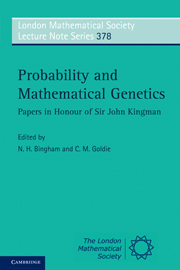Book contents
- Frontmatter
- Contents
- List of contributors
- Preface
- Bibliography of J. F. C. Kingman
- 1 A fragment of autobiography, 1957–1967
- 2 More uses of exchangeability: representations of complex random structures
- 3 Perfect simulation using dominated coupling from the past with application to area-interaction point processes and wavelet thresholding
- 4 Assessing molecular variability in cancer genomes
- 5 Branching out
- 6 Kingman, category and combinatorics
- 7 Long-range dependence in a Cox process directed by an alternating renewal process
- 8 Kernel methods and minimum contrast estimators for empirical deconvolution
- 9 The coalescent and its descendants
- 10 Kingman and mathematical population genetics
- 11 Characterizations of exchangeable partitions and random discrete distributions by deletion properties
- 12 Applying coupon-collecting theory to computer-aided assessments
- 13 Colouring and breaking sticks: random distributions and heterogeneous clustering
- 14 The associated random walk and martingales in random walks with stationary increments
- 15 Diffusion processes and coalescent trees
- 16 Three problems for the clairvoyant demon
- 17 Homogenization for advection-diffusion in a perforated domain
- 18 Heavy traffic on a controlled motorway
- 19 Coupling time distribution asymptotics for some couplings of the Lévy stochastic area
- 20 Queueing with neighbours
- 21 Optimal information feed
- 22 A dynamical-system picture of a simple branching-process phase transition
- Index
16 - Three problems for the clairvoyant demon
Published online by Cambridge University Press: 07 September 2011
- Frontmatter
- Contents
- List of contributors
- Preface
- Bibliography of J. F. C. Kingman
- 1 A fragment of autobiography, 1957–1967
- 2 More uses of exchangeability: representations of complex random structures
- 3 Perfect simulation using dominated coupling from the past with application to area-interaction point processes and wavelet thresholding
- 4 Assessing molecular variability in cancer genomes
- 5 Branching out
- 6 Kingman, category and combinatorics
- 7 Long-range dependence in a Cox process directed by an alternating renewal process
- 8 Kernel methods and minimum contrast estimators for empirical deconvolution
- 9 The coalescent and its descendants
- 10 Kingman and mathematical population genetics
- 11 Characterizations of exchangeable partitions and random discrete distributions by deletion properties
- 12 Applying coupon-collecting theory to computer-aided assessments
- 13 Colouring and breaking sticks: random distributions and heterogeneous clustering
- 14 The associated random walk and martingales in random walks with stationary increments
- 15 Diffusion processes and coalescent trees
- 16 Three problems for the clairvoyant demon
- 17 Homogenization for advection-diffusion in a perforated domain
- 18 Heavy traffic on a controlled motorway
- 19 Coupling time distribution asymptotics for some couplings of the Lévy stochastic area
- 20 Queueing with neighbours
- 21 Optimal information feed
- 22 A dynamical-system picture of a simple branching-process phase transition
- Index
Summary
Abstract
A number of tricky problems in probability are discussed, having in common one or more infinite sequences of coin tosses, and a representation as a problem in dependent percolation. Three of these problems are of ‘Winkler’ type, that is, they are challenges for a clairvoyant demon.
Keywords clairvoyant demon, dependent percolation, multiscale analysis, percolation, percolation of words, random walk
AMS subject classification (MSC2010) 60K35, 82B20, 60E15
Introduction
Probability theory has emerged in recent decades as a crossroads where many sub-disciplines of mathematical science meet and interact. Of the many examples within mathematics, we mention (not in order): analysis, partial differential equations, mathematical physics, measure theory, discrete mathematics, theoretical computer science, and number theory. The International Mathematical Union and the Abel Memorial Fund have recently accorded acclaim to probabilists. This process of recognition by others has been too slow, and would have been slower without the efforts of distinguished mathematicians including John Kingman.
JFCK's work looks towards both theory and applications. To single out just two of his theorems: the subadditive ergodic theorem [22, 23] is a piece of mathematical perfection which has also proved rather useful in practice; his ‘coalescent’ [24, 25] is a beautiful piece of probability, now a keystone of mathematical genetics. John is also an inspiring and devoted lecturer, who continued to lecture to undergraduates even as the Bristol Vice-Chancellor, and the Director of the Isaac Newton Institute in Cambridge.
- Type
- Chapter
- Information
- Probability and Mathematical GeneticsPapers in Honour of Sir John Kingman, pp. 380 - 396Publisher: Cambridge University PressPrint publication year: 2010
- 10
- Cited by



